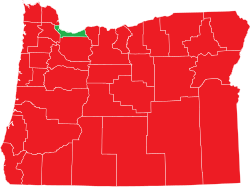Oregon Ballot Measure 67 (1998)
| Measure 67 | ||||||||||||||||
|---|---|---|---|---|---|---|---|---|---|---|---|---|---|---|---|---|
| Allows Medical Use of Marijuana Within Limits; Establishes Permit System | ||||||||||||||||
|
||||||||||||||||
|
||||||||||||||||
| Source: Oregon State Elections Division | ||||||||||||||||
| Measure 33 | ||||||||||||||||
|---|---|---|---|---|---|---|---|---|---|---|---|---|---|---|---|---|
| Amends Medical Marijuana Act: Requires Marijuana Dispensaries For Supplying Patients/Caregivers; Raises Patients' Possession Limit | ||||||||||||||||
|
||||||||||||||||
|
||||||||||||||||
| Source: Oregon State Elections Division | ||||||||||||||||
The Oregon Medical Marijuana Act, a law in the U.S. state of Oregon, was established by Oregon Ballot Measure 67 in 1998, passing with 54.6% support. It modified state law to allow the cultivation, possession, and use of marijuana by doctor recommendation for patients with certain medical conditions. The Act does not affect federal law, which still prohibits the cultivation and possession of marijuana.
Measure 33 in 2004 sought to extend the law by mandating distribution centers, but was rejected by voters. Measure 74 in 2010 sought to provide access to medical cannabis for patients through licensed and regulated non-profit dispensaries, fund medical research, establish a program to assist low-income patients and help finance Oregon health programs.
The Act made Oregon the second state in the United States, after California's Proposition 215 in 1996, to remove criminal penalties for medical marijuana. It established the first state registry for medical marijuana users. Since the U.S. federal government does not recognize medical marijuana, the Act affects only state law. In other words, U.S. federal penalties remain.
The official ballot title given by the Oregon Secretary of State for the 1998 campaign was "Allows Medical Use of Marijuana Within Limits; Establishes Permit System". The measure removed state criminal penalties for patients with "debilitating medical conditions" whose doctor verifies the condition and that medical marijuana may help it. Some qualifying conditions include: cachexia, cancer, chronic pain, epilepsy and other disorders characterized by seizures, glaucoma, HIV or AIDS, multiple sclerosis and other disorders characterized by muscle spasticity, and nausea.
...
Wikipedia


